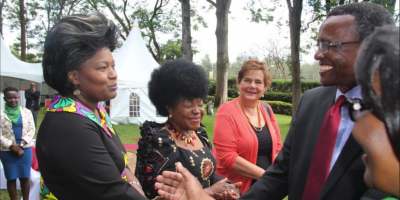
Over 50 women judges, representing chapters of the International Association of Women Judges across the African continent, convened to discuss the critical role and contribution women justice professionals play in adjudicating cases of gender-based violence at a regional conference in Nairobi from November 29 to December 1, 2018.
The conference was organized by the International Women Judges Association Kenya Chapter in collaboration with the Kenyan Ministry of Public Service, Youth and Gender Affairs and State Department of Gender with the technical support of IDLO.
Held at a moment when gender-based violence was at the forefront of the international community’s agenda during the 16 days of activism campaign, the discussions revolved around knowledge sharing and partnerships between the countries represented to combat systemic impunity towards gender-based violence.
The conference provided a platform for women judges hailing from a range of countries - including Kenya, Uganda, Tanzania, Liberia, South Sudan, Somalia and Zambia - to adopt a regional approach to gender-based violence by joining forces to channel collective knowledge and inform local solutions.
Gender-based violence in the African context
Women survivors of violence face numerous obstacles in their quest to access justice, regardless of country or origin. Regionally, stigma and discriminatory attitudes often impede the effective investigation and prosecution of such crimes, and institutional infrastructure, such as specialized courts, is not always present or lacks sufficient capacity to handle cases.
In many African countries, informal and traditional justice mechanisms remain the most available remedy, especially for marginalized or disadvantaged populations, due to their accessibility, affordability and expediency. However, the use of alternative dispute resolution does not always result in justice – informal systems are not always aligned with international human rights standards and can perpetuate impunity instead of delivering meaningful justice to survivors.
Despite a raft of legislation and policy frameworks, participants acknowledged that gender-based violence was still prevalent in the region due to weak enforcement mechanisms, lack of awareness, harmful cultural practices, and poverty and gender discrimination, among others. Consequently, comprehensively addressing gender-based violence calls for strategies that transcend legal and policy intervention.
The discussions focused on a variety of issues namely: the status of gender equality and women’s empowerment vis-a-vis gender-based violence in the African context, experiences with the investigation, prosecution and adjudication of gender-based violence cases, as well as pathways, models and effective strategies for overcoming barriers to the resolution of gender-based violence cases.
The power of women judges
Beyond its intrinsic value, there is growing evidence to support the critical contributions women judges make to advancing justice for women survivors of violence. Female justice professionals have contributed to the development of laws and policies that address gender-specific legal issues and pave the path for better gender justice.
Conference participants acknowledged the vital role of the judiciary, as the final arbiter in the justice chain and shared best practices for judiciaries to implement within their respective domestic legal frameworks. Given the challenges facing the successful investigation and prosecution of gender-based violence, the conference identified various mitigatory measures to enhance access to justice for women, children and vulnerable populations.
“There cannot be access to justice and equality if women and marginalized groups do not get an opportunity to enjoy their rights,” affirmed Romualdo Mavedzenge, IDLO’s Regional Manager for New Initiatives Africa.
The conference concluded with an adoption of a Memorandum of Understanding to implement the recommendations and resolutions emerging from the discussions. Going forward, participants will aim to establish the International Association of Women Judges – Africa to encourage regional engagement for female justice sector actors towards the adjudication of GBV cases.
IDLO has been active in Kenya since 2009 providing strategic policy development, critical legislative review, expert technical advice, institutional strengthening and capacity building.
IDLO recently launched a new report on Women Delivering Justice: Contributions, Barriers, Pathways, which amplifies the importance of women’s leadership in the justice sector and reaffirms their professional participation in decision making bodies as a human right as well as a means of improving justice for women. The report explains the multiple values and implications of enhancing women’s participation in the justice sector.
Photo credit: Twitter - The Kenya Judiciary

